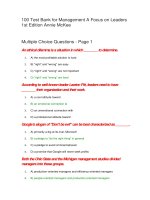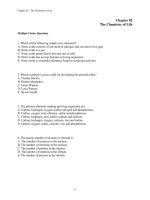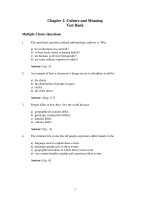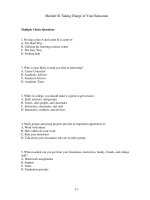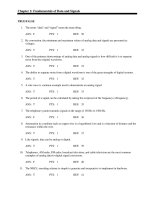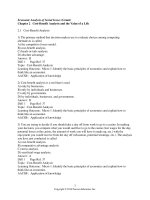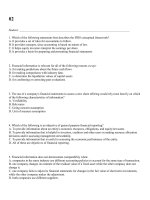Management a focus on leaders 1st edition annie mckee test bank
Bạn đang xem bản rút gọn của tài liệu. Xem và tải ngay bản đầy đủ của tài liệu tại đây (179.3 KB, 23 trang )
Management: A Focus on Leaders (McKee)
Chapter 2 The Leadership Imperative
1) People tend to remember the bad leaders they have known rather than the good ones.
Answer: TRUE
Diff: 2
Page Ref:18
Objective: 01
2) According to well-known leader Lawton Fitt, change within an organization is something that
is ubiquitous and should never come as a surprise.
Answer: TRUE
Diff: 2
Page Ref:19
Objective: 01
3) The statement, Leaders are born, not made, is more true today than ever.
Answer: FALSE
Diff: 2
Page Ref:19
Objective: 01
4) When it comes to success in business, basic intelligence is more important than competency.
Answer: FALSE
Diff: 2
Page Ref:20
Objective: 02
5) A competency is an ability that is directly linked to job performance.
Answer: TRUE
Diff: 2
Page Ref:20
Objective: 02
6) In the Iceberg Model, skills and knowledge are abilities that are hidden beneath the surface of
an individual.
Answer: FALSE
Diff: 2
Page Ref:20
Objective: 02
7) Limbic resonance is a term that refers to the fact that emotions are contagious.
Answer: TRUE
Diff: 2
Page Ref:24
Objective: 02
8) Emotions actually travel from one person to another in the form of an electrical potential.
Answer: FALSE
Diff: 2
Page Ref:24
Objective: 02
1
Copyright © 2011 Pearson Education, Inc
9) Legitimate power is the ability to influence others through fear or punishment.
Answer: FALSE
Diff: 2
Page Ref:26
Objective: 03
10) Managers who subscribe to the Theory X view of people are more likely to empower
employees than those who believe in Theory Y.
Answer: FALSE
Diff: 2
Page Ref:29
Objective: 03
11) The secret to responsible management and leadership is for leaders to be ethical.
Answer: TRUE
Diff: 2
Page Ref:31
AACSB: Ethical Understanding and Reasoning Abilities
Objective: 04
12) Honesty is a terminal value.
Answer: FALSE
Diff: 2
Page Ref:31
AACSB: Ethical Understanding and Reasoning Abilities
Objective: 04
13) Difficult ethical situations often define a company's reputation.
Answer: TRUE
Diff: 2
Page Ref:33
AACSB: Ethical Understanding and Reasoning Abilities
Objective: 04
14) Katherine Graham was one of the reporters who broke the Watergate story that brought
down President Nixon.
Answer: FALSE
Diff: 2
Page Ref:36
AACSB: Ethical Understanding and Reasoning Abilities
Objective: 04
15) An ethical dilemma is a situation in which it is not clear what the "right thing to do" is.
Answer: TRUE
Diff: 2
Page Ref:35
AACSB: Ethical Understanding and Reasoning Abilities
Objective: 04
16) In the Leadership Grid, a 1,9 managing style is called Country Club management because it
caters to people's needs at the expense of efficiency.
Answer: TRUE
Diff: 2
Page Ref:42
Objective: 05
2
Copyright © 2011 Pearson Education, Inc
17) Fiedler's Contingency Theory states that leaders must change style according to the situation.
Answer: FALSE
Diff: 2
Page Ref:43
Objective: 05
18) In the Situational Theory, managers match their managing style to how ready and able their
workers are.
Answer: TRUE
Diff: 2
Page Ref:43
Objective: 05
19) A transactional leader uses his or her vision to inspire employees.
Answer: FALSE
Diff: 2
Page Ref:45
Objective: 06
20) The Whistleblower Protection Act of 1989 protects whistleblowers from employer
retaliation.
Answer: FALSE
Diff: 2
Page Ref:48
Objective: 07
21) According to well-known leader Lawton Fitt, leaders need to have ________ their
organization and their work.
A) a cool attitude toward
B) an emotional connection to
C) an unemotional connection with
D) a professional attitude toward
Answer: B
Diff: 2
Page Ref:19
Objective: 01
22) The idea of a workplace that is stable and has continuity is ________ today's world.
A) a critical component of
B) something to strive for in
C) not realistic in
D) still very important in
Answer: C
Diff: 2
Page Ref:19
Objective: 01
3
Copyright © 2011 Pearson Education, Inc
23) Successful leaders see change as this.
A) an opportunity
B) a disruption
C) a necessary evil
D) a nuisance
Answer: A
Diff: 2
Page Ref:19
Objective: 01
24) Which statement is true?
A) Leaders can only be born, not made.
B) You can learn how to be a great leader.
C) You cannot learn how to be a great leader.
D) The only way to learn to lead is to be forced to lead.
Answer: B
Diff: 1
Page Ref:19
Objective: 01
25) Which of the following is NOT one of the three secrets to becoming an outstanding leader?
A) emotional and social competence
B) power
C) ethics
D) cunning
Answer: D
Diff: 2
Page Ref:19
Objective: 01
26) Competencies include both intent and ________ and are always related to ________.
A) action; intelligence
B) motivation; leadership
C) leadership; action
D) action; performance
Answer: D
Diff: 2
Page Ref:20
Objective: 02
27) Research indicates that there is ________ correlation between intelligence and job
performance.
A) no
B) little
C) a strong
D) a reverse
Answer: B
Diff: 2
Page Ref:20
Objective: 02
4
Copyright © 2011 Pearson Education, Inc
28) In the Iceberg Model, these factors are hidden "below the water line."
A) motives, traits, and self-concept
B) motives, skills, and traits
C) traits, knowledge, skills
D) self-concept, drivers, skills
Answer: A
Diff: 2
Page Ref:20
Objective: 02
29) Being able to see the "big picture" pattern in a complicated situation is this kind of
competency.
A) cognitive
B) relational
C) technical
D) subconscious
Answer: A
Diff: 2
Page Ref:22
Objective: 02
30) These competencies distinguish superior performers from ordinary performers.
A) sustaining
B) threshold
C) differentiating
D) undifferentiating
Answer: C
Diff: 2
Page Ref:21
Objective: 02
31) The conclusion of the studies of Richard Boyatzis's group is that these competencies make
the difference for leadership.
A) friendliness and sociability
B) technical skill and basic intelligence
C) knowledge, skills, and flexibility
D) emotional and social intelligence
Answer: D
Diff: 2
Page Ref:22
Objective: 02
32) Which of these competency categories is NOT a key component of social and emotional
intelligence?
A) self-awareness
B) self-management
C) self-consciousness
D) social awareness
Answer: C
Diff: 2
Page Ref:22
Objective: 02
5
Copyright © 2011 Pearson Education, Inc
33) Emotions are able to ________ in a process called limbic resonance.
A) travel from one person to another
B) elevate a person's mood
C) interfere with rational thought processes
D) cause people to become distracted
Answer: A
Diff: 2
Page Ref:24
AACSB: Communication Abilities
Objective: 02
34) What people call intuition is usually just this.
A) picking up clues from body language, facial expressions, and positioning
B) making educated guesses about who a person is and what he or she is likely to do
C) inaccurate guessing that has no validity
D) a form of extra-sensory perception
Answer: A
Diff: 2
Page Ref:24
Objective: 02
35) The president of a company holds this kind of power.
A) reward power — because she controls employee pay
B) coercive power — because she can force people to do things
C) legitimate power — because her power comes from her position
D) illegitimate power — because no person should have control over others
Answer: C
Diff: 2
Page Ref:26
Objective: 03
36) The primary force behind coercive power is ________.
A) the ability to trade
B) valuable rewards
C) the threat of punishment
D) the power of persuasion
Answer: C
Diff: 2
Page Ref:27
Objective: 03
37) The key to referent power is ________.
A) fear
B) whom you know
C) respect and admiration
D) being well-known
Answer: C
Diff: 2
Page Ref:27
Objective: 03
6
Copyright © 2011 Pearson Education, Inc
38) Managers can avoid micromanagement by doing this.
A) monitoring employees as closely as possible
B) empowering employees to make their own decisions
C) using majority rule for all decision-making
D) looking only at the "big picture" and avoiding details
Answer: B
Diff: 2
Page Ref:28
Objective: 03
39) A manager with a Theory Y view of human nature is more likely to ________.
A) distrust his employees and watch them carefully
B) trust his employees and empower them with decision-making ability
C) give his employees lifetime job opportunities if they are competent
D) institute strict reward systems to induce employees to work hard
Answer: B
Diff: 2
Page Ref:30
Objective: 03
40) A key reason why empowerment is successful in today's organizations is that ________.
A) workers are more intelligent in today's workplace
B) workers are more responsible in today's workplace
C) the person who organized the work can make the best decisions in a given situation
D) the person who is closest to the work can usually make the best decisions in a given situation
Answer: D
Diff: 2
Page Ref:30
Objective: 03
41) Which of the following is a terminal value?
A) creativity
B) honesty
C) know-how
D) justice
Answer: D
Diff: 2
Page Ref:31
Objective: 04
42) Which of the following is an instrumental value?
A) love
B) ambition
C) peace
D) freedom
Answer: B
Diff: 2
Page Ref:31
Objective: 04
7
Copyright © 2011 Pearson Education, Inc
43) The profession you choose is likely to have ________.
A) its own set of ethical standards
B) no set of ethical standards
C) a set of ethical standards that conflicts with your personal ethical standards
D) a written set of standards that must be committed to memory
Answer: A
Diff: 1
Page Ref:32
AACSB: Ethical Understanding and Reasoning Abilities
Objective: 04
44) A stakeholder in a company is a party that has ________.
A) no interest in the ethics of the company
B) majority ownership of the company
C) minority ownership in the company
D) an interest in the company's success or failure
Answer: D
Diff: 2
Page Ref:34
Objective: 04
45) This kind of ethics accounts for the fact that dogs are often pampered in the United States
while they are treated little better than rats in some foreign countries.
A) individual
B) organizational
C) societal
D) professional
Answer: C
Diff: 2
Page Ref:33
AACSB: Ethical Understanding and Reasoning Abilities
Objective: 04
46) The Sarbanes-Oxley Act established strict guidelines ________.
A) to prevent corruption in Congress
B) to prevent slack oversight in company boards
C) to promote diversity in company boards
D) to eliminate oversight in company boards
Answer: B
Diff: 2
Page Ref:34
AACSB: Ethical Understanding and Reasoning Abilities
Objective: 04
8
Copyright © 2011 Pearson Education, Inc
47) In terms of business ethics, ________ be held legally and ethically responsible for misdeeds.
A) organizations cannot
B) individuals only can
C) both individuals and organizations can
D) neither individuals and organizations can
Answer: C
Diff: 2
Page Ref:34
AACSB: Ethical Understanding and Reasoning Abilities
Objective: 04
48) An ethical dilemma is a situation in which ________ to determine.
A) the most profitable solution is hard
B) "right" and "wrong" are easy
C) "right" and "wrong" are not important
D) "right" and "wrong" are hard
Answer: D
Diff: 2
Page Ref:35
AACSB: Ethical Understanding and Reasoning Abilities
Objective: 04
49) Katherine Graham faced an ethical dilemma in doing this.
A) being the first newspaper to publish the Pentagon Papers
B) publishing Woodward's and Bernstein's articles on Watergate
C) turning the old-fashioned Washington Post into a national newspaper
D) voting to impeach President Richard Nixon
Answer: B
Diff: 2
Page Ref:36
AACSB: Ethical Understanding and Reasoning Abilities
Objective: 04
50) Google's slogan of "Don't be evil" can be best characterized as ________.
A) primarily a dig at its rival, Microsoft
B) a pledge to "do the right thing" in general
C) a pledge to avoid criminal behavior
D) a promise that Google will never seek profits
Answer: B
Diff: 3
Page Ref:36
AACSB: Ethical Understanding and Reasoning Abilities
Objective: 04
9
Copyright © 2011 Pearson Education, Inc
51) Which of the following is NOT a common statement that helps people rationalize unethical
behavior?
A) Everyone does it.
B) If I don't do it, I'll get fired.
C) My boss told me to do it.
D) The ends fail to justify the means.
Answer: D
Diff: 3
Page Ref:38
AACSB: Ethical Understanding and Reasoning Abilities
Objective: 04
52) The first step in preventing a lapse into unethical behavior is to do this.
A) follow your company's code of ethics
B) avoid situations in which ethics are involved
C) clarify your own personal code of ethics
D) go by the rules, no matter what the situation is
Answer: C
Diff: 2
Page Ref:39
AACSB: Ethical Understanding and Reasoning Abilities
Objective: 04
53) Trait theories of leadership tried to identify ________ that could identify a successful leader.
A) results from a battery of physical and psychological tests
B) habits, customs, and traditions
C) physical qualities, such as symmetry,
D) permanent characteristics, such as intelligence and sociability,
Answer: D
Diff: 2
Page Ref:40
Objective: 05
54) In the 1960s, researchers turned away from trait theories that studied who a leader was and
moved toward studies that analyzed ________.
A) how the leader behaved
B) what the leader's background was
C) what the leader's goals were
D) how much social intelligence the leader had
Answer: A
Diff: 2
Page Ref:41
Objective: 05
10
Copyright © 2011 Pearson Education, Inc
55) Both the Ohio State and the Michigan management studies divided managers into these
groups.
A) production-oriented managers and efficiency-oriented managers
B) people-oriented managers and production-oriented managers
C) people-oriented managers and employee-oriented managers
D) effectiveness-oriented managers and time-oriented managers
Answer: B
Diff: 2
Page Ref:41
Objective: 05
56) A manager with a 6,4 rating on the Leadership Grid is likely to be ________.
A) a little more production-oriented than people-oriented
B) a little more people-oriented than production-oriented
C) much more production-oriented than people-oriented
D) much more people-oriented than production-oriented
Answer: A
Diff: 2
Page Ref:42
AACSB: Analytic Skills
Objective: 05
57) Which statement best describes contingency approaches to leadership?
A) A leader must have certain leadership characteristics.
B) A leader cannot change his or her leadership style.
C) Different situations require different leadership styles.
D) A leader can change his or her leadership style.
Answer: C
Diff: 2
Page Ref:43
Objective: 05
58) Fred Fiedler's contingency scheme states that since leaders could not ________, the only way
to be successful was to ________.
A) maintain a constant leadership style; place the leader in a variety of different situations
B) change their leadership style; place the leader in a favorable situation
C) maintain a constant leadership style; make the followers change their style
D) change their leadership style; make the followers change their style
Answer: B
Diff: 2
Page Ref:43
Objective: 05
59) The Situational Leadership Theory was the first theory to focus on ________.
A) looking at the traits of successful leaders
B) which approaches worked best with followers
C) asking followers to change their behavior
D) looking at the behaviors of successful leaders
Answer: B
Diff: 2
Page Ref:43
Objective: 05
11
Copyright © 2011 Pearson Education, Inc
60) The idea behind the Path-goal theory is to ________.
A) suggest a possible path for employees to reach their goal and remove any obstacles in the
way.
B) allow employees to find their own paths to their goals without any managerial interference
C) create rigid paths to employee goals that are the same for all employees
D) provide a path for employees to reach their goal and clear the path of any possible obstacles
Answer: D
Diff: 2
Page Ref:44
Objective: 05
61) Transactional leaders try to ________.
A) inspire rather than reward employees
B) provide a vision for employees to strive for
C) trade rewards for a job well-done
D) convince employees that they don't need to be rewarded
Answer: C
Diff: 2
Page Ref:45
Objective: 06
62) Transformational leaders usually have this above all other traits.
A) energy
B) drive
C) intelligence
D) charisma
Answer: D
Diff: 2
Page Ref:46
Objective: 06
63) HR supports ethical behavior within organizations by ________.
A) creating and enforcing a strict ethical code
B) exposing employees to simulated ethical dilemmas that they might face
C) providing a role model for other employees
D) refusing to provide compensation to employees for unethical practices
Answer: B
Diff: 2
Page Ref:47
Objective: 07
64) According to the Stanford Graduate School's Business Advisory Council, ________ is by far
the most important characteristic that a leader can have.
A) self-awareness
B) honesty
C) humility
D) energy
Answer: A
Diff: 2
Page Ref:50
Objective: 08
12
Copyright © 2011 Pearson Education, Inc
65) The kind of courage that great leaders have is the ability to resist ________ and do what you
know is right.
A) complacency
B) laziness
C) conformity
D) certainty
Answer: C
Diff: 2
Page Ref:52
AACSB: Ethical Understanding and Reasoning Abilities
Objective: 08
Shanika runs leadership seminars for young managers, entrepreneurs, and students. In one of her
recent sessions, a young man from a manufacturing company complained that he was just not a
"born leader."
66) How should Shanika respond?
A) Tell him that he may not ever be a good leader, but that he can become an effective manager
B) Tell him that leadership skills can and should be learned.
C) Tell him that leadership is not a necessary characteristic of a manager.
D) Tell him that he should readjust his goals and resign himself to the fact that he will never be a
great success.
Answer: B
Diff: 2
Page Ref:19
AACSB: Analytic Skills
Objective: 01
67) Another person from an insurance company told Shanika that in her performance reviews she
rates high in all areas except grasping the "big picture." What should Shanika suggest?
A) She should work on her cognitive competencies, the skills that help her identify and recognize
patterns.
B) She should work on her technical competencies, the skills that help her use tools common in
her industry.
C) She should work on her relational competencies, the skills that help her deal with people.
D) She should work on her self-concept, which includes attitudes, values, and self-image.
Answer: A
Diff: 3
Page Ref:22
AACSB: Analytic Skills
Objective: 02
13
Copyright © 2011 Pearson Education, Inc
68) A student in the group claims that his social and emotional intelligence is high, but he is not
very good at controlling his own emotions. What should Shanika say?
A) He is correct to think his social and emotional intelligence is high because social and
emotional intelligence has nothing to do with one's own emotions.
B) He shouldn't worry about his deficiency because social and emotional intelligence is not very
important in leadership.
C) He is mistaken to think his social and emotional intelligence is high because self
management, or controlling one's own emotions, is a key part of social and emotional
intelligence.
D) He shouldn't worry because self-control is not a very important part of social and emotional
intelligence.
Answer: C
Diff: 3
Page Ref:22
AACSB: Reflective Thinking Skills
Objective: 02
69) What kind of suggestions might Shanika make to help people be receptive to the emotions of
others?
A) Listen only to what people say, not what they do.
B) Read in between the lines of what people say.
C) Pay attention to body language, facial expressions, and how people are arranged in the room.
D) Ask people how they are feeling and give each response a numerical value from 1 to 10.
Answer: C
Diff: 2
Page Ref:24
AACSB: Communication Abilities
Objective: 02
70) One of the participants in the group wants to work on her self-awareness. Which question
might Shanika suggest that she ask herself?
A) What should I be doing to maximize my potential?
B) What am I feeling, and how are these feelings affecting my thoughts and actions?
C) How can I demonstrate to others that I am concerned with their welfare and genuinely care
about them?
D) Which feelings in this room are negative and should be rejected or ignored?
Answer: B
Diff: 3
Page Ref:25
AACSB: Reflective Thinking Skills
Objective: 02
14
Copyright © 2011 Pearson Education, Inc
Dawson Consulting is restructuring to make the firm more profitable. Mack Dyer, the current
CEO of the company is offering monetary rewards for anyone who brings in a potential client.
71) What kind of power is Mack employing?
A) legitimate power
B) expert power
C) referent power
D) reward power
Answer: A
Diff: 2
Page Ref:26
Objective: 03
72) Cynthia Wong is an analyst for the company. The company uses her data to make all of its
business predictions. Cynthia is asking for a special 12-week working vacation. What kind of
power is she using?
A) soft power
B) reward power
C) coercive power
D) expert power
Answer: D
Diff: 2
Page Ref:27
Objective: 03
73) Bonnie Dawson, who originally founded the company, has asked employees to forego their
raises for the upcoming year, due to a downturn in profits. Bonnie is beloved by just about
everyone in the company. What kind of power is she attempting to use?
A) coercive power
B) legitimate power
C) referent power
D) inherent power
Answer: C
Diff: 2
Page Ref:27
Objective: 03
74) Several supervisors have told workers that if they don't increase their production, they will
lose their Christmas bonuses. What kind of power are the supervisors attempting to use?
A) referent power
B) coercive power
C) impact power
D) expert power
Answer: B
Diff: 2
Page Ref:27
Objective: 03
15
Copyright © 2011 Pearson Education, Inc
75) One of Dawson's clients, Mr. Vasquez, has told the company that he will pay for a golf
vacation in Florida if they can solve his current cash flow problem. What kind of power is Mr.
Vasquez using?
A) reward power
B) referent power
C) coercive power
D) legitimate power
Answer: A
Diff: 2
Page Ref:27
Objective: 03
To take advantage of an expiring car warranty, Daniel claimed that his car had broken down a
day earlier than the actual break-down occurred.
76) Which code of ethics did Daniel violate in this situation?
A) Daniel's professional code of ethics
B) Daniel's personal code of ethics
C) Daniel did not violate a code of ethics.
D) a societal code of ethics
Answer: B
Diff: 2
Page Ref:32
AACSB: Ethical Understanding and Reasoning Abilities
Objective: 04
77) At the dealer, the maintenance technician saw that Daniel qualified for a free oil change and
car wash, but decided not to tell him about it. There is no law requiring the technician to inform
Daniel of this service, but the company prides itself on "looking out for its customers."
Which code of ethics did the technician violate in this situation?
A) The technician did not violate a code of ethics.
B) a personal code of ethics
C) an organizational code of ethics
D) a societal code of ethics
Answer: C
Diff: 2
Page Ref:33
AACSB: Ethical Understanding and Reasoning Abilities
Objective: 04
16
Copyright © 2011 Pearson Education, Inc
78) The dealer where Daniel brought his car makes some of its workers work overtime hours
without any compensation.
Which code of ethics did the dealer violate in this situation?
A) a societal code of ethics
B) a professional code of ethics
C) a personal code of ethics
D) an organizational code of ethics
Answer: A
Diff: 3
Page Ref:33
AACSB: Ethical Understanding and Reasoning Abilities
Objective: 04
79) The dealer ends up overcharging Daniel. Daniel goes to a lawyer who takes the case, not
telling Daniel that she is also on retainer for the same dealer.
Which code of ethics did the lawyer violate in this situation?
A) an organizational code of ethics
B) a personal code of ethics
C) a professional code of ethics
D) a societal code of ethics
Answer: C
Diff: 3
Page Ref:32
AACSB: Ethical Understanding and Reasoning Abilities
Objective: 04
80) When Daniel learns that the lawyer acted inappropriately, he puts a stop-payment on the
check he gave her.
Which code of ethics did Daniel violate in this situation?
A) Daniel did not violate a code of ethics.
B) Daniel's personal code of ethics
C) an organizational code of ethics
D) a societal code of ethics
Answer: A
Diff: 3
Page Ref:32
AACSB: Ethical Understanding and Reasoning Abilities
Objective: 04
17
Copyright © 2011 Pearson Education, Inc
81) Why do you think that most people encounter more bad leaders in their lives than good ones?
A) People remember only the bad experiences, not the good ones.
B) Leaders have no sense of right and wrong.
C) Leaders fail to consciously develop their leadership skills.
D) Professional management schools fail to pay any attention to ethics and morality.
Answer: C
Diff: 3
Page Ref:18
AACSB: Analytic Skills
Objective: 01
82) Why does trying to conduct business as an instrumental exchange ultimately fail for most
leaders?
A) Workers never fail to continually up the price of the reward they demand, eventually breaking
down the system.
B) Workers have an emotional connection with their work that demands more than material
reward.
C) Human nature says that sooner or later one party or the other in an exchange will stop dealing
in good faith.
D) Workers are never motivated by rewards. They want stability and peace of mind.
Answer: B
Diff: 3
Page Ref:19
AACSB: Analytic Skills
Objective: 01
83) In the Iceberg Model, where would a quality like optimism be located?
A) Optimism is a trait, so it would be located "below the water line."
B) Optimism is a skill, so it would be located "above the water line."
C) Optimism is a trait, so it would be located "above the water line."
D) Optimism is a motive, so it would be located "below the water line."
Answer: A
Diff: 3
Page Ref:20
AACSB: Analytic Skills
Objective: 02
18
Copyright © 2011 Pearson Education, Inc
84) For a leader at a highly creative and innovative company, would the ability to get workers
motivated about their work be considered a threshold or a differentiating competency?
A) a differentiating competency, because only the best leaders have the ability to get workers
motivated about their work
B) a differentiating competency, because getting workers to be motivated about their work is a
requirement at a company that is creative and innovative
C) a threshold competency, because getting workers to be motivated about their work is a
requirement at a company that is creative and innovative
D) a threshold competency, because only the best leaders have the ability to get workers
motivated about their work
Answer: C
Diff: 3
Page Ref:21
AACSB: Analytic Skills
Objective: 02
85) A candidate for a leadership position in a company seems to have all of the qualifications for
the job except self-awareness. Should the company hire this person?
A) No, because self-awareness is a critical part of social and emotional intelligence and
leadership
B) Yes, because self-awareness is only one of many components of social and emotional
intelligence
C) Yes, because self-awareness and social and emotional intelligence are not critically important
to leadership
D) No, because a self-awareness and social and emotional intelligence indicates dishonesty in a
person
Answer: A
Diff: 3
Page Ref:23
AACSB: Analytic Skills
Objective: 02
86) Which of these statements most accurately characterizes the trait called "women's intuition."
A) "Women's intuition," if it exists, is probably an indication that women are more logical than
men.
B) "Women's intuition," if it exists, is probably an indication that women are less logical than
men.
C) "Women's intuition," if it exists, is probably an indication that women are more emotional
than men.
D) "Women's intuition," if it exists, is probably an indication that women are better at reading
body language than men.
Answer: D
Diff: 3
Page Ref:24
AACSB: Analytic Skills
Objective: 02
19
Copyright © 2011 Pearson Education, Inc
87) The president of a university offers her school's basketball coach the following deal: If he
qualifies for the NCAA tournament, he will receive a three-year contract extension. If he fails to
make the tournament, he will be fired. What kinds of power is the president exercising?
A) legitimate power, expert power, and referent power
B) legitimate power, expert power, and coercive power
C) legitimate power, reward power, and coercive power
D) expert power, reward power, and coercive power
Answer: C
Diff: 3
Page Ref:27
AACSB: Analytic Skills
Objective: 03
88) Which of the following involves the least clear-cut case of rationalizing unethical behavior?
A) failing to report a crime because you don't want to get involved
B) failing to report a crime because you are too busy
C) failing to report a crime because you could implicate people you know
D) failing to report a crime because you fear retaliation from the perpetrator
Answer: D
Diff: 3
Page Ref:38
AACSB: Ethical Understanding and Reasoning Abilities
Objective: 04
89) Which of the following statements about trait theories of leadership is most accurate?
A) All trait theories of leadership have been shown to be flawed and worthless.
B) All trait theories of leadership have been shown to be superior to other leadership theories.
C) Though trait theories of leadership are flawed, some traits, like self-awareness, can accurately
predict who the best leaders are.
D) Though trait theories of leadership are flawed, some traits, like extroversion and intelligence,
can accurately predict who the best leaders are.
Answer: C
Diff: 3
Page Ref:40
AACSB: Analytic Skills
Objective: 05
90) What was the biggest problem with Fred Fiedler's Contingency Theory?
A) Fiedler suggested that the situation determines which leadership style works best.
B) Fiedler suggested that leadership styles were permanent, so a leader could not change style
depending on the situation.
C) Fiedler suggested that leadership styles were not permanent, so a leader would not have a
consistent style in any given situation.
D) Fiedler suggested that employees' readiness determines which leadership style works best.
Answer: B
Diff: 3
Page Ref:43
AACSB: Analytic Skills
Objective: 05
20
Copyright © 2011 Pearson Education, Inc
91) Are scandals like the one carried out by Bernard Madoff a failure of leadership or a failure of
ethics? Explain.
Answer: Madoff in many ways was a superb leader. He was able to convince people that he was
talented and worth following. He was also able to carry out his scheme for many years without
being detected. Rather than a leadership problem, Madoff's flaw was a failure of ethics. He
completely failed to realize that his scheme would only end up hurting people and causing him to
be punished. In the end, Madoff failed, or refused, to recognize right from wrong.
Diff: 3
Page Ref:18
AACSB: Ethical Understanding and Reasoning Abilities
Objective: 01
92) Why does Lawton Fitt insist that people may take the first hill with you, but will not follow
to take subsequent hills unless you make an emotional connection with them?
Answer: Lawton Fitt makes the point that people's work makes up a large and important part of
their lives. Therefore, they are (usually) emotionally connected to their work. Leaders who
exploit this emotional connection will succeed at first. However, if the workers sense that their
leader doesn't really care about them in a deep sense, they will respond by failing to give back in
a deep sense. In other words, they may follow up one tough hill but not others once they see that
they do not share a true bond with their leader.
Diff: 3
Page Ref:19
AACSB: Analytic Skills
Objective: 01
93) Your supervisor tells you to destroy all e-mails involved in a project because it could cause
trouble for him and the organization. What would you do?
Answer: Sample response: Destroying the e-mails would violate my personal code of ethics.
However, I would fear losing my job if I did not comply with my supervisor's request. So before
destroying the e-mails, I would go to a higher-up in the organization and ask what my options
are. I would hope that this person would take over from that point on.
Diff: 3
Page Ref:32
AACSB: Ethical Understanding and Reasoning Abilities
Objective: 04
94) As a rookie manager in a video game company, it is your job to give a performance review
for an employee who has not been doing a good job. You decide to bring a senior manager who
has been a mentor to many employees at the company and is widely respected in the organization
to the review. Is your behavior ethical? Is it likely to be effective? Explain.
Answer: Sample response: Yes, my behavior is both ethical and likely to succeed. An employee
is much more likely to accept and believe negative feedback if the feedback comes with the
support of a highly respected member of the organization. The move is also ethical because it
does not violate the rights or the worker and it is designed to make the feedback session more
productive.
Diff: 3
Page Ref:35
AACSB: Ethical Understanding and Reasoning Abilities
Objective: 04
21
Copyright © 2011 Pearson Education, Inc
95) Does Google's Code of Conduct, "Don't be evil," just a joke or does it have serious
implications? In your view, does the company live up to its slogan?
Answer: Sample response: I think the slogan does have serious implications. From the very
beginning, Google refused to do such things as put banner ads on its home web page, or sell
search rankings to the highest bidder. In doing so, Google earned a loyal following who trusted
their searches to be unbiased and their ads to be unobtrusive. Lately, Google has been involved
in some moral dilemmas. For example, in China the company initially allowed the government to
apply political biases and other types of filters to its searches. Google rationalized these moves
by saying it was better to have a limited search ability in China than no search at all. However,
later events caused Google to re-think its China operations, and reassess itself with respect to
"not doing evil."
Diff: 3
Page Ref:36
AACSB: Ethical Understanding and Reasoning Abilities
Objective: 04
96) In what kind of organization do you think a Path-Goal style of leadership would work best?
Explain.
Answer: A Path-Goal style of leadership has the leader spend time removing obstacles and
clearing the path for employees to reach their goals. To be successful in this kind of practice, the
employees would need to be highly independent, motivated, and talented. The approach assumes
that the employees can do the job as long as they aren't slowed down or hindered by
bureaucratic/ organizational concerns. A company like an engineering firm, with highly
educated, autonomous workers, would be likely to work best with this approach.
Diff: 3
Page Ref:44
AACSB: Analytic Skills
Objective: 05
97) Why are transformational leaders more likely to be successful in today's business climate
than transactional leaders?
Answer: Transactional leaders rely on rewards to keep employees motivated. Rewards,
however, can only go so far. At a successful organization, what truly motivates people is being
passionate about what they do, not what they receive in exchange for doing what they do. That is
why transformational leaders do best in that kind of situation. They can provide a vision that
makes employees want to follow. Employees of a transformational leader don't need to be
"bribed" with compensation; they work hard because they believe in their leader and their
leader's cause.
Diff: 3
Page Ref:46
AACSB: Analytic Skills
Objective: 06
22
Copyright © 2011 Pearson Education, Inc
98) A whistle-blower in an organization gives confidential records to the government to reveal
serious crimes. Disclosing these records is a serious breach of the organization's code of ethics.
Should the whistle-blower lose her job?
Answer: Sample response: No, the whistle-blower should not lose her job. Though she violated
company policy and ethics, she did so for a greater cause. Therefore, if the allegations prove to
be true she should be treated as a hero because she rooted out corruption and saved the
organization from even more serious consequences, had the corrupt practices been allowed to
continue.
Diff: 3
Page Ref:48
AACSB: Ethical Understanding and Reasoning Abilities
Objective: 07
99) What does Jim Hightower's statement, "even a dead fish can go with the flow" mean to you?
Answer: Sample response: Hightower was trying to point out the fact that conformity is in a
sense, a form of not being alive. People who conform and go along with a bad situation are
failing to be fully alive. They are less than alive because they don't have the courage to speak out
about a wrong or an injustice.
Diff: 3
Page Ref:52
AACSB: Reflective Thinking Skills
Objective: 08
100) How self-aware of a person are you? What might you do to become more self-aware?
Answer: Sample response: I am fairly self-aware, but I would like to improve my selfawareness. To do this, I can start out by asking myself questions such as, What am I feeling, and
how are these feelings affecting my thoughts and actions? From there, I can go on to adopting, in
general, a more reflective way of operating. After a meeting, for example, I might ask myself,
How did I behave in that meeting? What effects did my behavior have on others? Is it possible
that someone in the room was upset and I didn't notice it? Questions like these can help me
become more self-aware and a better leader.
Diff: 3
Page Ref:52
AACSB: Reflective Thinking Skills
Objective: 08
23
Copyright © 2011 Pearson Education, Inc

